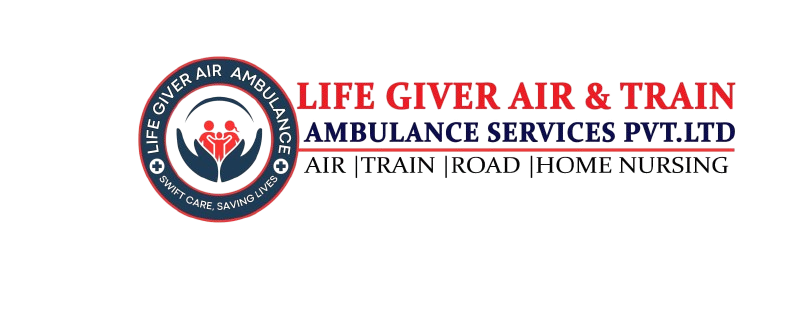Common Questions About Our Services
What services does Life Giver Air Ambulance provide?
Life Giver offers air, train, and road ambulance services with fully equipped ICU setups, home nursing services, dead body transportation, and stretcher services.
Are Life Giver’s services available 24/7?
Yes, we provide round-the-clock services for emergencies, patient transfers, and medical transportation.
How fast can Life Giver respond in emergencies?
Our team is trained to respond quickly and provide prompt care for patients in need of immediate transport.
Do you offer bed-to-bed transfer services?
Yes, we specialize in bed-to-bed transfer to ensure patient safety and comfort during transportation.
What medical professionals are on board during transportation?
Our team consists of experienced doctors, paramedics, and nurses, who ensure top-level care.
Do you provide road ambulance services for long-distance emergencies?
Yes, our road ambulance services are designed to offer safe and fast transportation over long distances.
What medical equipment is available in Life Giver Ambulance Services?
We provide advanced medical equipment based on the patient’s needs, including ICU setups, life support systems, and more.
How do I book a road ambulance?
You can contact us by phone or email to make a booking. We will assist with planning and coordination for transport.
Are the ambulances equipped for critical care?
All our ambulances are equipped to handle critical care, including ICU and emergency medical facilities.
What areas do you serve?
We serve Patna and surrounding areas, with services extending nationwide for air and train ambulances.
What is the cost of ambulance services?
The cost varies based on factors such as distance, type of service, and medical requirements. For a customized quote based on your specific needs, please get in touch with our team directly. We will assess your requirements and provide you with the most accurate support.
Do you offer home nursing services?
Yes, we provide home nursing services for patients who need continuous care at home.
How do you handle dead body transportation?
We ensure respectful, safe, and timely transport of deceased individuals, with full legal compliance.
Can I transport a patient with mobility issues?
Yes, we provide commercial stretcher services for patients with mobility challenges, ensuring comfort and safety.
Is insurance accepted for ambulance services?
Please contact us to check if your insurance plan covers ambulance services. We assist with the process.
How can I get in touch for emergency transport?
You can call us directly at our emergency contact number for immediate assistance.
What is an air ambulance?
An air ambulance is a specially equipped aircraft, such as a helicopter or airplane, used to transport critically ill or injured patients quickly and safely to medical facilities.
When is an air ambulance service needed?
Air ambulance services are typically needed when a patient requires immediate medical care in situations where ground transportation is not feasible due to distance, traffic, or the severity of the condition. It’s often used for emergencies, medical evacuations, or transfers between hospitals.
How do I arrange for an air ambulance?
To arrange an air ambulance, you can contact a service provider directly through their helpline or website. Medical professionals or doctors can also facilitate the process by providing necessary medical information and coordinating the flight.
Can patients of all ages use Life Giver air ambulance services?
Yes, Life Giver air ambulance services can accommodate patients of all ages, from infants to the elderly. Specialized equipment and medical staff are available for pediatric, neonatal, or geriatric patients, depending on the situation.
How long does it take to arrange an air ambulance?
The time it takes to arrange an air ambulance depends on the location of the patient and the availability of the service. In emergencies, air ambulance services can be mobilized within a few minutes to a couple of hours.
Are there any safety concerns with Life Giver air ambulance services?
Air ambulance services are generally very safe, as they adhere to strict aviation and medical standards. The Life Giver air ambulance services are accredited by regulatory bodies and follow proper safety protocols to ensure the highest level of care during the flight.
What is a train ambulance?
A train ambulance is a specially equipped train compartment designed to transport critically ill or injured patients. It is fitted with medical equipment like life support systems, oxygen, and other necessary tools, along with medical staff to provide care during the journey.
When should I opt for a train ambulance?
Train ambulance services are typically used when a patient requires non-emergency medical transportation over long distances. They are ideal for situations where the patient needs constant medical supervision but doesn’t require the speed of an air ambulance.
How do I book Life Giver train ambulance Services?
To book a train ambulance, you can contact an ambulance service provider who operates train-based medical transport. They will require medical details, including the patient’s condition, and arrange the necessary travel and medical staff based on the journey’s distance and complexity.
What medical facilities are available on a train ambulance?
A train ambulance is equipped with various medical facilities like a stretcher, oxygen supply, cardiac monitors, ventilators, and other emergency medical equipment. The medical team, which may include doctors, nurses, and paramedics, is available to monitor and care for the patient throughout the journey.
What are the advantages of using a Life Giver train ambulance?
The main advantages of a train ambulance include a relatively more comfortable and spacious environment compared to road or air ambulances, especially for long-distance travel. It also offers a stable ride, which can be beneficial for patients who need extended transport with medical supervision. Additionally, train ambulance services may be more cost-effective than air ambulances for certain routes.

